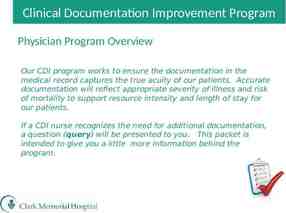Firewalls 國立陽明交通大學資工系資訊中心 Computer Center of Department of
57 Slides1.02 MB

Firewalls 國立陽明交通大學資工系資訊中心 Computer Center of Department of Computer Science, NYCU 1

Firewalls Firewall hardware/software choke point between secured and unsecured network filter incoming and outgoing traffic prevent communications which are forbidden by the security policy What it can be used to do Incoming: protect and insulate the applications, services and machines Such as telnet, NetBIOS Outgoing: limit or disable access from the internal network Such as MSN, ssh, ftp, facebook, SC2, D3 NAT (Network Address Translation) 2

Typical Network Design Host Host The Internet Firewall Host Host Host Host Host 3

Firewalls – Capabilities Network Layer Firewalls Operate at a low level of TCP/IP stack as IP-packet filters. Filter attributes Source/destination IP Source/destination port TTL Protocols Application Layer Firewalls Work on the application level of the TCP/IP stack. Inspect all packets for improper content, a complex work! TCP/IP Application Transport Internet Network Interface Application Firewalls The access control implemented by applications. TCP Wrapper (libwrap) 4

Firewalls – Rules Exclusive Only block the traffic matching the rulesets Inclusive Only allow the traffic matching the rulesets Offer much better control of the incoming/outgoing traffic Safer than exclusive one (Y) reduce the risk of allowing unwanted traffic to pass (N) increase the risk to block yourself with wrong configuration State Stateful Keep track of which connections are opened through the firewall Be vulnerable to Denial of Service (DoS) attacks Stateless 5

Firewalls – DMZ Host Demilitarized zone (Perimeter Network) Between untrusted and trusted networks Limited access to internal networks Open service to WAN (Internet) SMTP POP3 HTTP VPN Servers Host Host Intranet (LAN) WWW DNS Mail DMZ Firewall A layer of security Limit the damage if system is compromised Router 6

Firewalls – Bastion Host A workstation allow users connect to internal service Limit the entry point of the internal network Do logging and auditing on it Located in DMZ or behind VPN service https://github.com/jumpserver/jumpserver Using an SSH Bastion Host transparently Bastion Host Client SSH Connection: Destination Host SSH Agent Forwarding SSH Agent Connection: Destination Host 7

Firewalls – Packages Linux iptables (kernel 2.4 ) ipchains (kernel 2.4) Firewalld ufw FreeBSD IPFILTER (known as IPF) IPFIREWALL (known as IPFW) Dummynet Packet Filter (known as PF) ALTQ migrated from OpenBSD v4.5 (In FreeBSD 9.0) http://www.openbsd.org/faq/pf/ v5.0 8

iptables in Linux 國立陽明交通大學資工系資訊中心 Computer Center of Department of Computer Science, NYCU 9

iptables User-space software that control Linux kernel firewall Control Linux kernel Netfilter modules Support kernel version 2.4 Replace ipchains and ipfwadm iptables allows system administrators to define tables containing chains of rules for the treatment of packets 10

Packet flow in Netfilter File:Netfilter-packet-flow.svg - Wikimedia Commons 11

Xtables Architecture Xtables v4, v6, arp, eb IPv4, IPv6 are different tables Tables filter, nat, mangle Chains PREROUTING, OUTPUT, FORWARD, INPUT, POSTROUTING Rules e.g., iptables -A INPUT -i lo -j ACCEPT 12

Xtables Architecture – Filter Filter Table The default table of iptables command For packets filter INPUT Packets that come in (to local) OUTPUT Packets that go out (from local) FORWARD Packets that pass through (from others to others) 13

Xtables Architecture – NAT NAT tables For IP masquerade PREROUTING Packets that will go into the routing tables POSTROUTING Packets that have left the routing tables OUTPUT Packets that go out (from local) 14

Xtables Architecture – Mangle Mangle Table For special purpose, e.g., add or remove some special tags from packets PREROUTING OUTPUT FORWARD INPUT POSTROUTING 15

iptables Flowchart 16

iptables – List iptables -t tables : Target table -L : List all rules -n : Don't lookup domain names -v : Show details sudo iptables -L -n Chain INPUT (policy ACCEPT) target prot opt source ACCEPT all -- 0.0.0.0/0 ACCEPT all -- 0.0.0.0/0 Chain FORWARD (policy ACCEPT) target prot opt source destination 0.0.0.0/0 0.0.0.0/0 destination Chain OUTPUT (policy ACCEPT) target prot opt source destination Chain BLOCK (1 references) target prot opt source DROP all -- 0.0.0.0/0 target prot opt source destination 0.0.0.0/0 destination 17

iptables – Init iptables -F : Flush all rules -X : Flush all custom chains -Z : Flush all statistics data for all chains iptables -P [INPUT,OUTPUT,FORWARD] [ACCEPT, DROP] Change the default policy of the target chain 18

iptables – Save and Restore iptables-restore Restore from restore file iptables-save Export all rules and generate restore file Some system will load restore file at boot Ex: CentOS /etc/sysconfig/iptables /etc/sysconfig/ip6tables Restore file syntax # comments * table name : chain default-policy [pkt:byte] Rules COMMIT (End of file) 19

iptables – Module User may need special rule to filter packets Split several feature into different module Stateful Packets states tracking Traffic statistics Use -m to access module iptables -A INPUT -m conntrack iptables -A INPUT -m recent http://ipset.netfilter.org/iptables-extensions.man.html 20

iptables – Rules (1/2) Modify -A, --append -C, --check -D, --delete -I, --insert -R, --replace Jump -j, --jump To user-defined chain ACCEPT, DROP, REJECT, RETURN, SNAT, DNAT, MASQUERADE -g, --goto Unlike the --jump option return will not continue processing in this chain but instead in the chain that called us via --jump. 21

iptables – Rules (2/2) Filter -i, -o [if] : incoming interface / outgoing interface -i ens192 -o docker0 -s, -d [net] : Source / Destination -s 192.168.0.1/24 –d 140.113.1.1 --sport, --dport [port] : Source port / Destination port --sport 22 --dport 80 -p [protocol] : tcp, udp, icmp, all -p icmp ! (not) : Invert matching ! -s 140.113.1.0/24 ! -i eth0 ! -p udp 22

iptables – Custom chain Create -N my-chain Define in restore file When iptables reaches the end of user-defined chain, flow returns to the next rule in the calling chain E.g. -A INPUT -j badguy -A INPUT -j ACCEPT -A badguy -s 1.2.3.4 -j DROP -A badguy -s 140.112.0.0/24 -j DROP 23

Example: Hello world Allow outgoing packets but deny all incoming packets, except the packets that reply users requests -A INPUT -i lo -j ACCEPT -A INPUT -m conntrack --ctstate RELATED,ESTABLISHED -j ACCEPT State NEW : New connection ESTABLISHED : Old connection RELATED : New connection create by ESTABLISHED session INVALID 24

Example: NAT Provides NAT from eth0 to eth1 sysctl -w net.ipv4.ip forward 1 -t NAT -A POSTROUTING -i eth0 -o eth1 -j MASQUERADE NAT SNAT --to-source : Change Source IP Address DNAT --to-destination : Change Destination IP Address MASQUERADE : Change Source IP Address (based on outgoing device IP Address) 25

Example: Prevent DDoS Attack Append traffic limit (10 times / 60 sec) to SSH services -A INPUT -p tcp --dport 22 -m state --state NEW -m recent --set -name RECENT --rsource -A INPUT -p tcp --dport 22 -m state --state NEW -m recent --rcheck --seconds 60 --hitcount 10 --name RECENT --rsource -j DROP xt recent Record every connection Filter connection by connecting history 26

Other tools These tools help user to manage iptables rules UFW (Uncomplicated Firewall) (Ubuntu) Easy to use Hard to customize Firewalld (Redhat) Another way to manage your firewall Sometime even with these tools, you still need to understand iptables, otherwise you cannot manage complicated firewall rules like docker network, kubernetes 27

PF in FreeBSD 國立陽明交通大學資工系資訊中心 Computer Center of Department of Computer Science, NYCU 28

Packet Filter (PF) Functionality Filtering packets NAT Load balance QoS: (ALTQ: Alternate Queuing) Failover (pfsync carp) 29

PF in FreeBSD – Enable pf* In /etc/rc.conf (kernel modules loaded automatically) pf enable "YES" pflog enable "YES" pfsync enable "YES" Kernel configurations device device device pf pflog pfsync 30
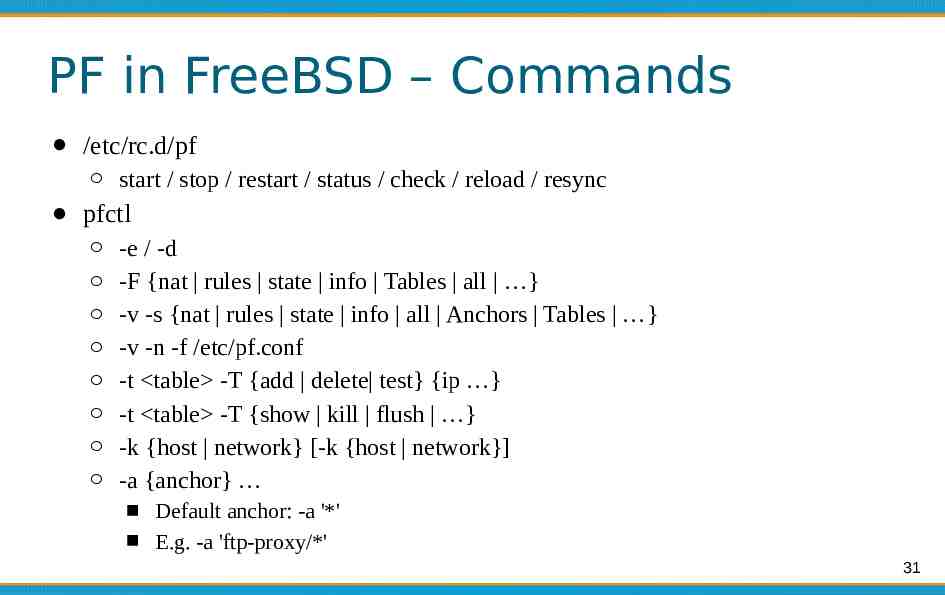
PF in FreeBSD – Commands /etc/rc.d/pf start / stop / restart / status / check / reload / resync pfctl -e / -d -F {nat rules state info Tables all } -v -s {nat rules state info all Anchors Tables } -v -n -f /etc/pf.conf -t table -T {add delete test} {ip } -t table -T {show kill flush } -k {host network} [-k {host network}] -a {anchor} Default anchor: -a '*' E.g. -a 'ftp-proxy/*' 31
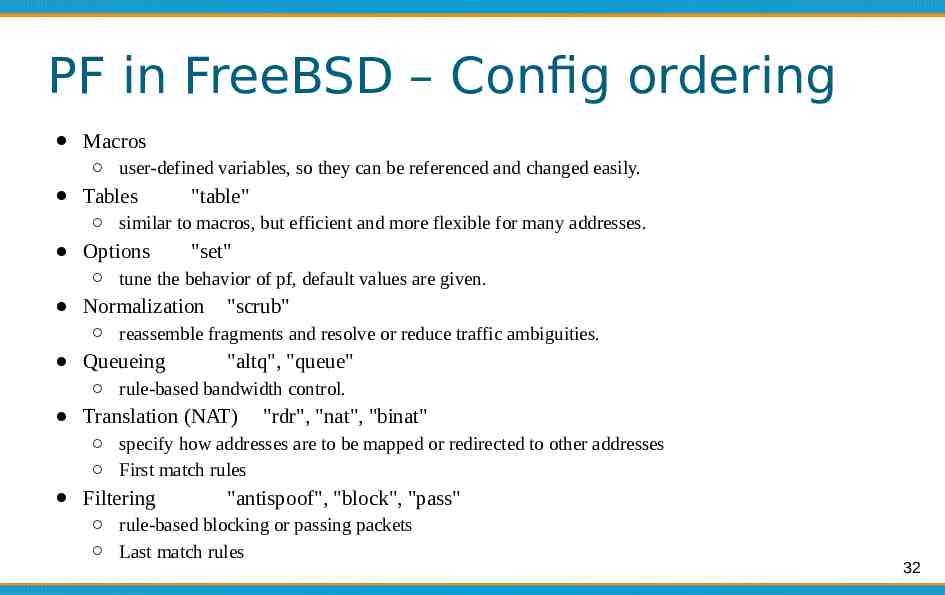
PF in FreeBSD – Config ordering Macros user-defined variables, so they can be referenced and changed easily. Tables "table" similar to macros, but efficient and more flexible for many addresses. Options "set" tune the behavior of pf, default values are given. Normalization "scrub" reassemble fragments and resolve or reduce traffic ambiguities. Queueing "altq", "queue" rule-based bandwidth control. Translation (NAT) "rdr", "nat", "binat" specify how addresses are to be mapped or redirected to other addresses First match rules Filtering "antispoof", "block", "pass" rule-based blocking or passing packets Last match rules 32
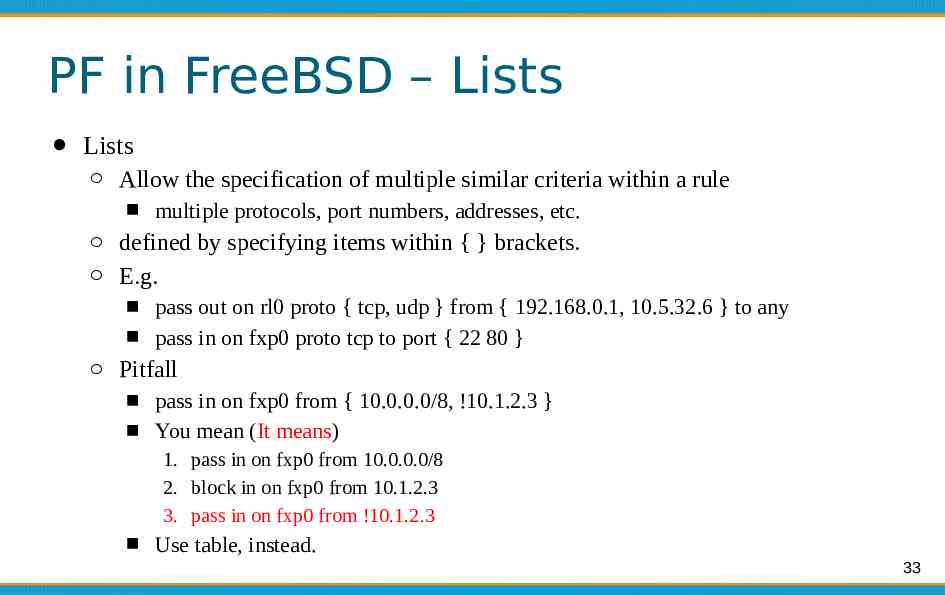
PF in FreeBSD – Lists Lists Allow the specification of multiple similar criteria within a rule multiple protocols, port numbers, addresses, etc. defined by specifying items within { } brackets. E.g. pass out on rl0 proto { tcp, udp } from { 192.168.0.1, 10.5.32.6 } to any pass in on fxp0 proto tcp to port { 22 80 } Pitfall pass in on fxp0 from { 10.0.0.0/8, !10.1.2.3 } You mean (It means) 1. pass in on fxp0 from 10.0.0.0/8 2. block in on fxp0 from 10.1.2.3 3. pass in on fxp0 from !10.1.2.3 Use table, instead. 33
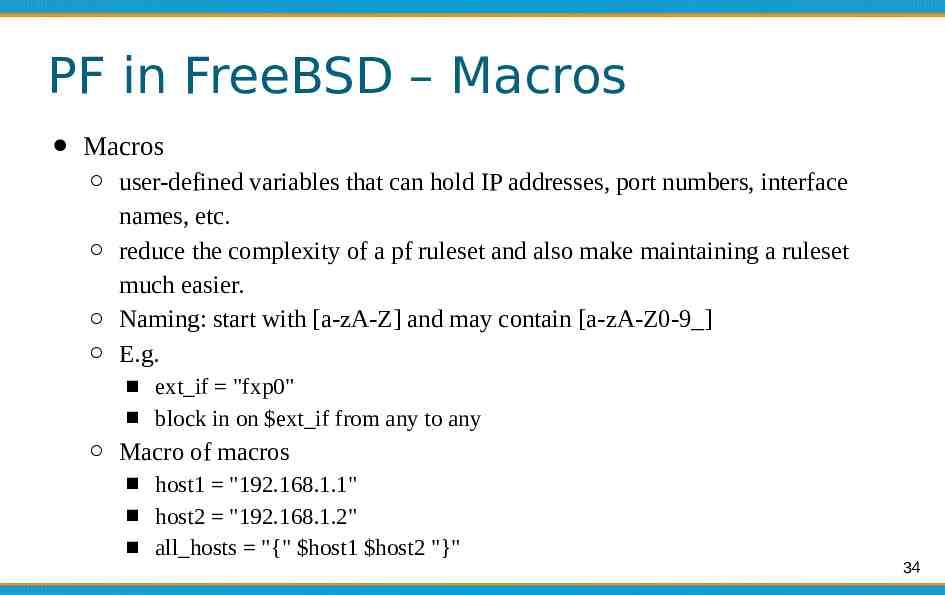
PF in FreeBSD – Macros Macros user-defined variables that can hold IP addresses, port numbers, interface names, etc. reduce the complexity of a pf ruleset and also make maintaining a ruleset much easier. Naming: start with [a-zA-Z] and may contain [a-zA-Z0-9 ] E.g. ext if "fxp0" block in on ext if from any to any Macro of macros host1 "192.168.1.1" host2 "192.168.1.2" all hosts "{" host1 host2 "}" 34
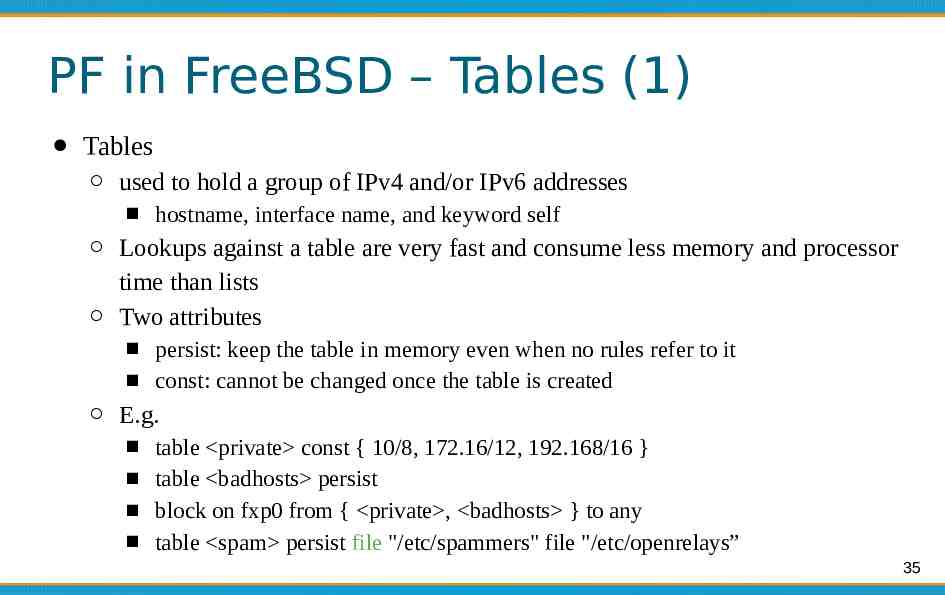
PF in FreeBSD – Tables (1) Tables used to hold a group of IPv4 and/or IPv6 addresses hostname, interface name, and keyword self Lookups against a table are very fast and consume less memory and processor time than lists Two attributes persist: keep the table in memory even when no rules refer to it const: cannot be changed once the table is created E.g. table private const { 10/8, 172.16/12, 192.168/16 } table badhosts persist block on fxp0 from { private , badhosts } to any table spam persist file "/etc/spammers" file "/etc/openrelays” 35
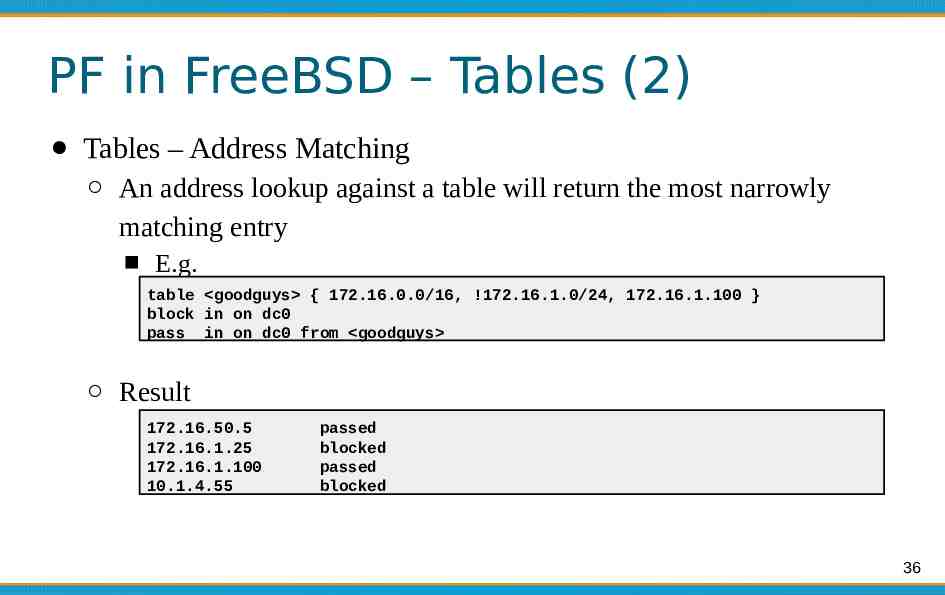
PF in FreeBSD – Tables (2) Tables – Address Matching An address lookup against a table will return the most narrowly matching entry E.g. table goodguys { 172.16.0.0/16, !172.16.1.0/24, 172.16.1.100 } block in on dc0 pass in on dc0 from goodguys Result 172.16.50.5 172.16.1.25 172.16.1.100 10.1.4.55 passed blocked passed blocked 36
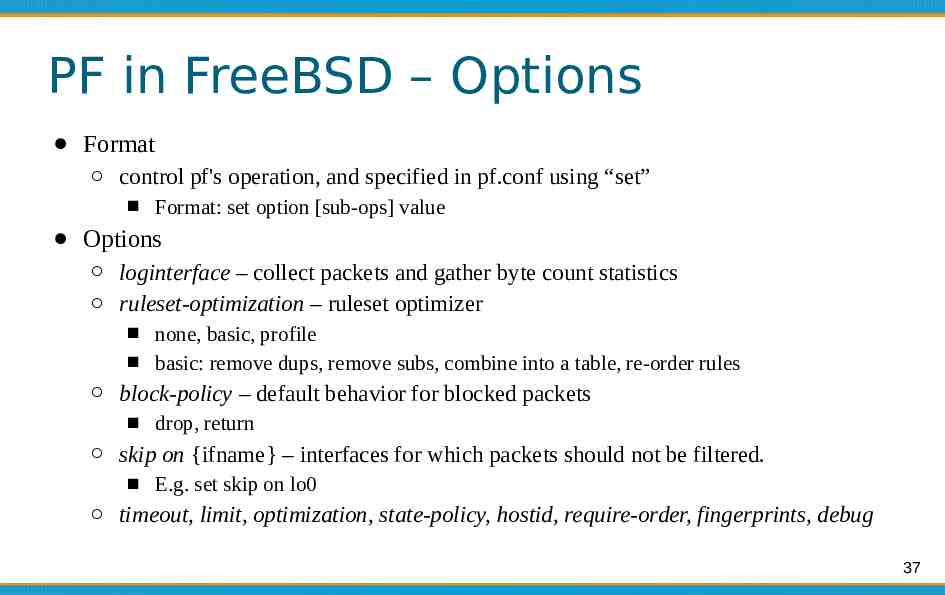
PF in FreeBSD – Options Format control pf's operation, and specified in pf.conf using “set” Format: set option [sub-ops] value Options loginterface – collect packets and gather byte count statistics ruleset-optimization – ruleset optimizer none, basic, profile basic: remove dups, remove subs, combine into a table, re-order rules block-policy – default behavior for blocked packets drop, return skip on {ifname} – interfaces for which packets should not be filtered. E.g. set skip on lo0 timeout, limit, optimization, state-policy, hostid, require-order, fingerprints, debug 37
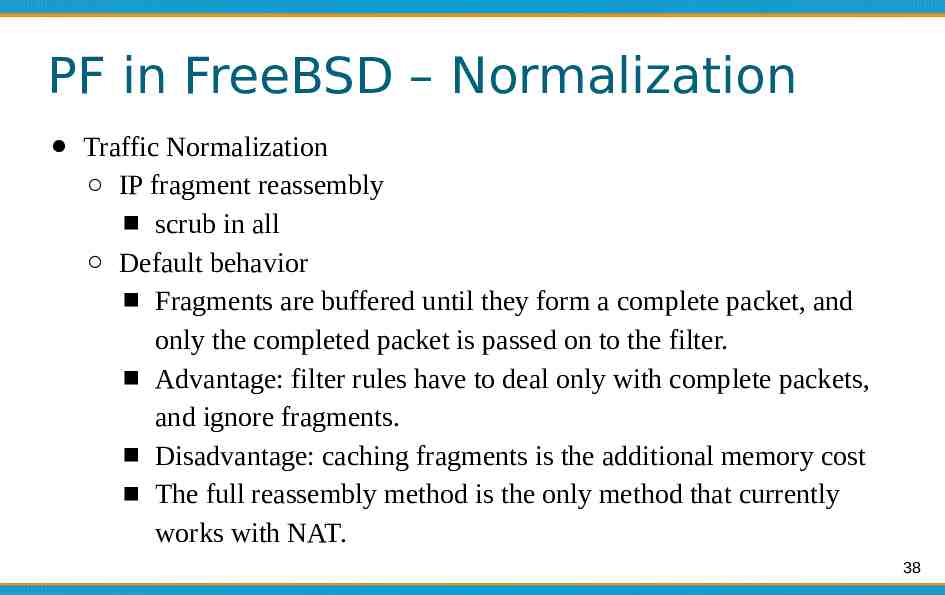
PF in FreeBSD – Normalization Traffic Normalization IP fragment reassembly scrub in all Default behavior Fragments are buffered until they form a complete packet, and only the completed packet is passed on to the filter. Advantage: filter rules have to deal only with complete packets, and ignore fragments. Disadvantage: caching fragments is the additional memory cost The full reassembly method is the only method that currently works with NAT. 38
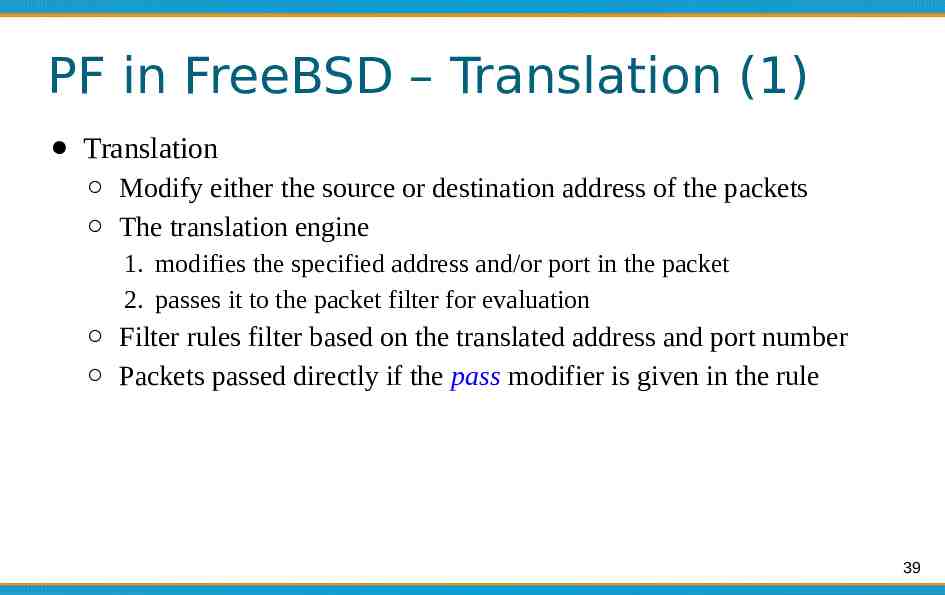
PF in FreeBSD – Translation (1) Translation Modify either the source or destination address of the packets The translation engine 1. modifies the specified address and/or port in the packet 2. passes it to the packet filter for evaluation Filter rules filter based on the translated address and port number Packets passed directly if the pass modifier is given in the rule 39
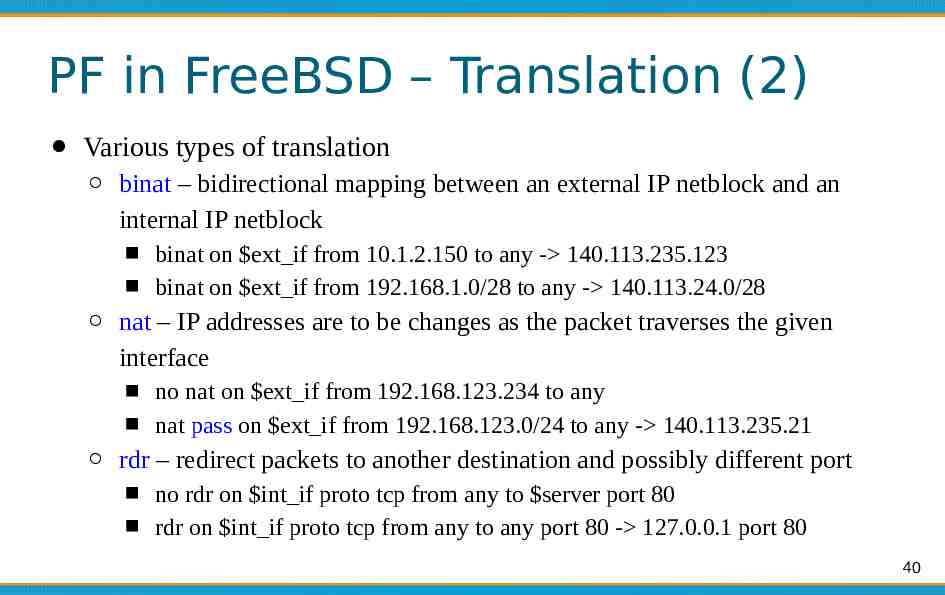
PF in FreeBSD – Translation (2) Various types of translation binat – bidirectional mapping between an external IP netblock and an internal IP netblock binat on ext if from 10.1.2.150 to any - 140.113.235.123 binat on ext if from 192.168.1.0/28 to any - 140.113.24.0/28 nat – IP addresses are to be changes as the packet traverses the given interface no nat on ext if from 192.168.123.234 to any nat pass on ext if from 192.168.123.0/24 to any - 140.113.235.21 rdr – redirect packets to another destination and possibly different port no rdr on int if proto tcp from any to server port 80 rdr on int if proto tcp from any to any port 80 - 127.0.0.1 port 80 40
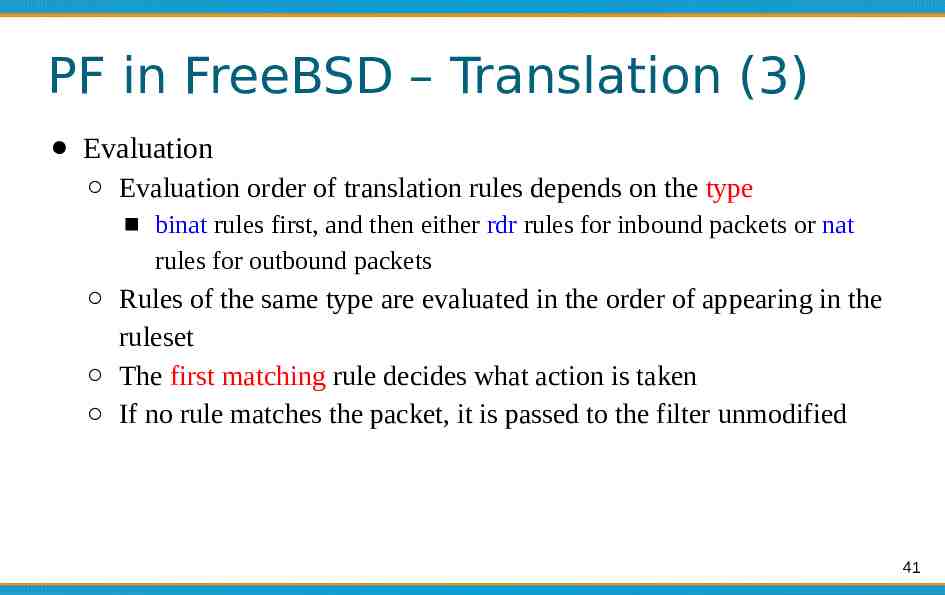
PF in FreeBSD – Translation (3) Evaluation Evaluation order of translation rules depends on the type binat rules first, and then either rdr rules for inbound packets or nat rules for outbound packets Rules of the same type are evaluated in the order of appearing in the ruleset The first matching rule decides what action is taken If no rule matches the packet, it is passed to the filter unmodified 41
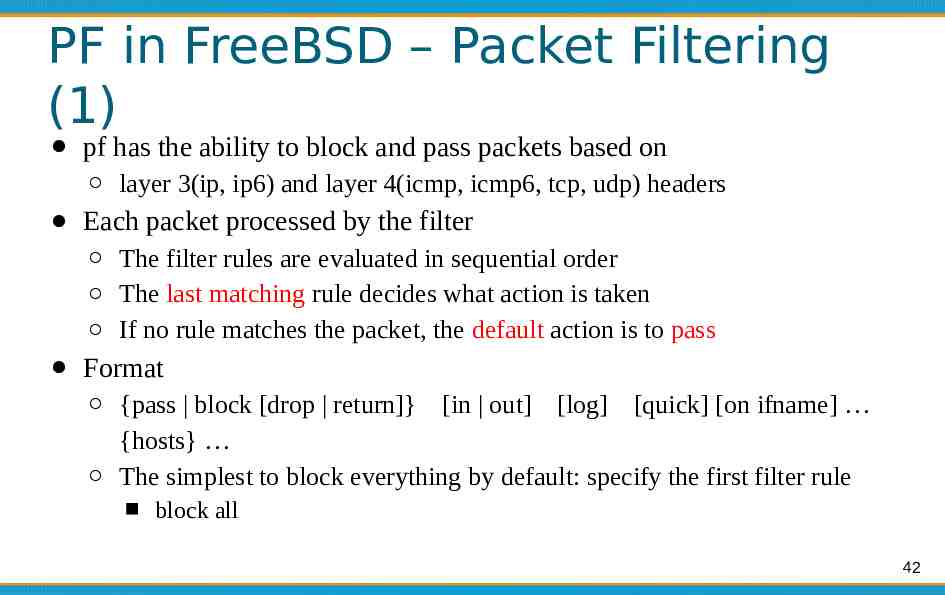
PF in FreeBSD – Packet Filtering (1) pf has the ability to block and pass packets based on layer 3(ip, ip6) and layer 4(icmp, icmp6, tcp, udp) headers Each packet processed by the filter The filter rules are evaluated in sequential order The last matching rule decides what action is taken If no rule matches the packet, the default action is to pass Format {pass block [drop return]} [in out] [log] [quick] [on ifname] {hosts} The simplest to block everything by default: specify the first filter rule block all 42
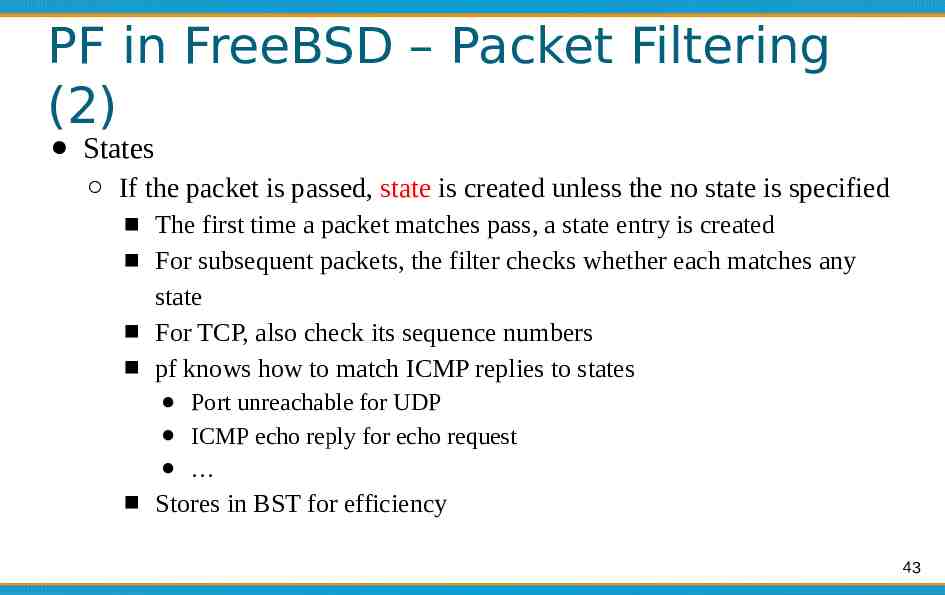
PF in FreeBSD – Packet Filtering (2) States If the packet is passed, state is created unless the no state is specified The first time a packet matches pass, a state entry is created For subsequent packets, the filter checks whether each matches any state For TCP, also check its sequence numbers pf knows how to match ICMP replies to states Port unreachable for UDP ICMP echo reply for echo request Stores in BST for efficiency 43
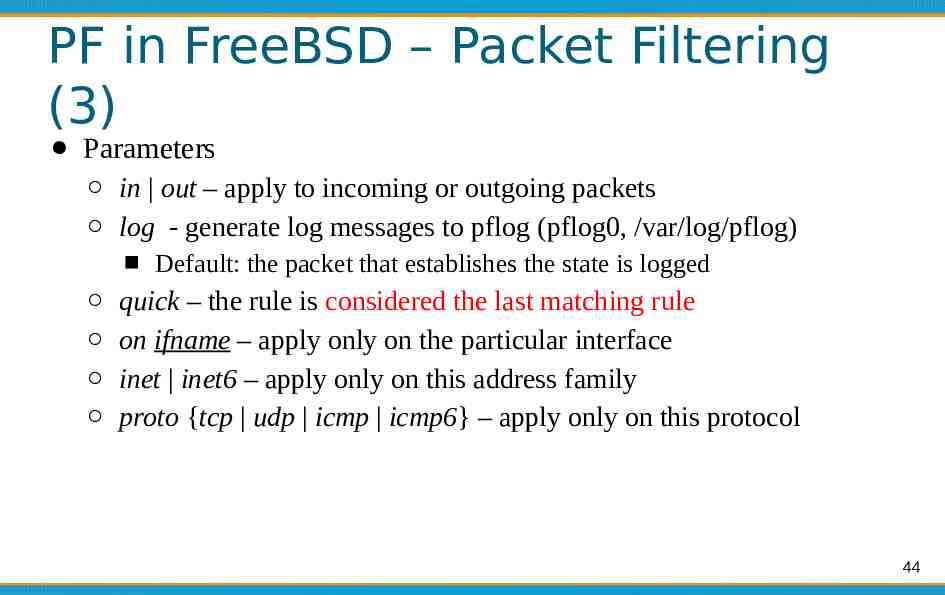
PF in FreeBSD – Packet Filtering (3) Parameters in out – apply to incoming or outgoing packets log - generate log messages to pflog (pflog0, /var/log/pflog) Default: the packet that establishes the state is logged quick – the rule is considered the last matching rule on ifname – apply only on the particular interface inet inet6 – apply only on this address family proto {tcp udp icmp icmp6} – apply only on this protocol 44
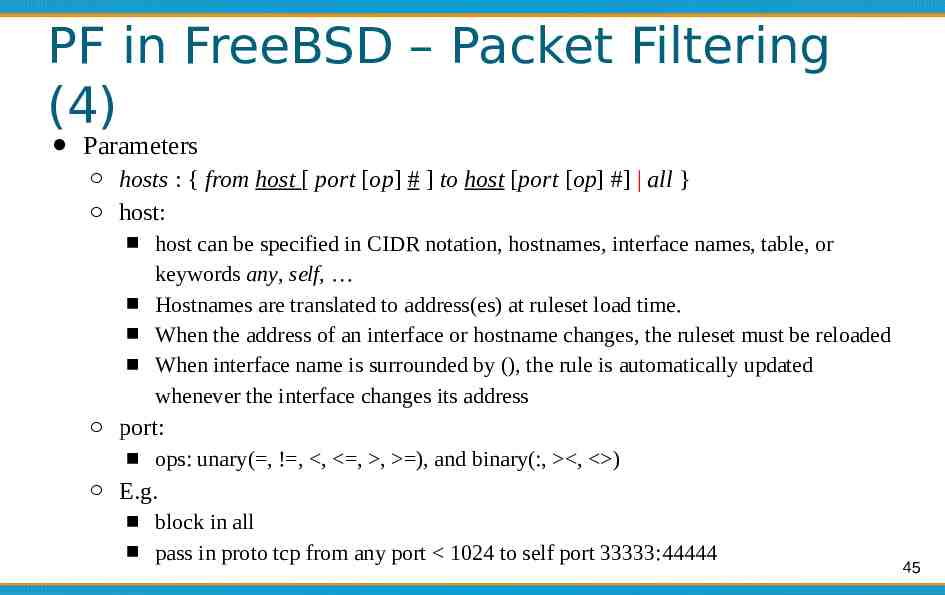
PF in FreeBSD – Packet Filtering (4) Parameters hosts : { from host [ port [op] # ] to host [port [op] #] all } host: host can be specified in CIDR notation, hostnames, interface names, table, or keywords any, self, Hostnames are translated to address(es) at ruleset load time. When the address of an interface or hostname changes, the ruleset must be reloaded When interface name is surrounded by (), the rule is automatically updated whenever the interface changes its address port: ops: unary( , ! , , , , ), and binary(:, , ) E.g. block in all pass in proto tcp from any port 1024 to self port 33333:44444 45
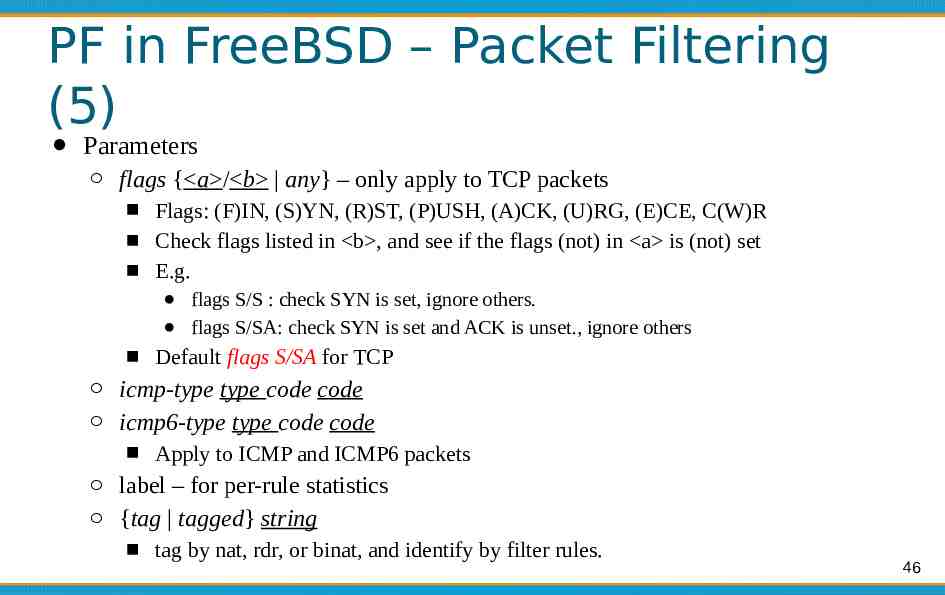
PF in FreeBSD – Packet Filtering (5) Parameters flags { a / b any} – only apply to TCP packets Flags: (F)IN, (S)YN, (R)ST, (P)USH, (A)CK, (U)RG, (E)CE, C(W)R Check flags listed in b , and see if the flags (not) in a is (not) set E.g. flags S/S : check SYN is set, ignore others. flags S/SA: check SYN is set and ACK is unset., ignore others Default flags S/SA for TCP icmp-type type code code icmp6-type type code code Apply to ICMP and ICMP6 packets label – for per-rule statistics {tag tagged} string tag by nat, rdr, or binat, and identify by filter rules. 46
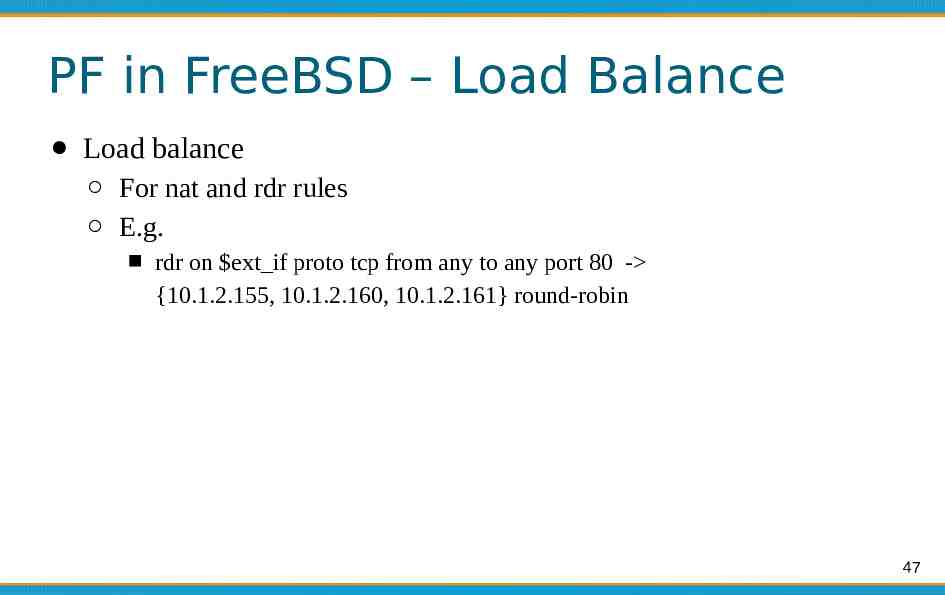
PF in FreeBSD – Load Balance Load balance For nat and rdr rules E.g. rdr on ext if proto tcp from any to any port 80 - {10.1.2.155, 10.1.2.160, 10.1.2.161} round-robin 47
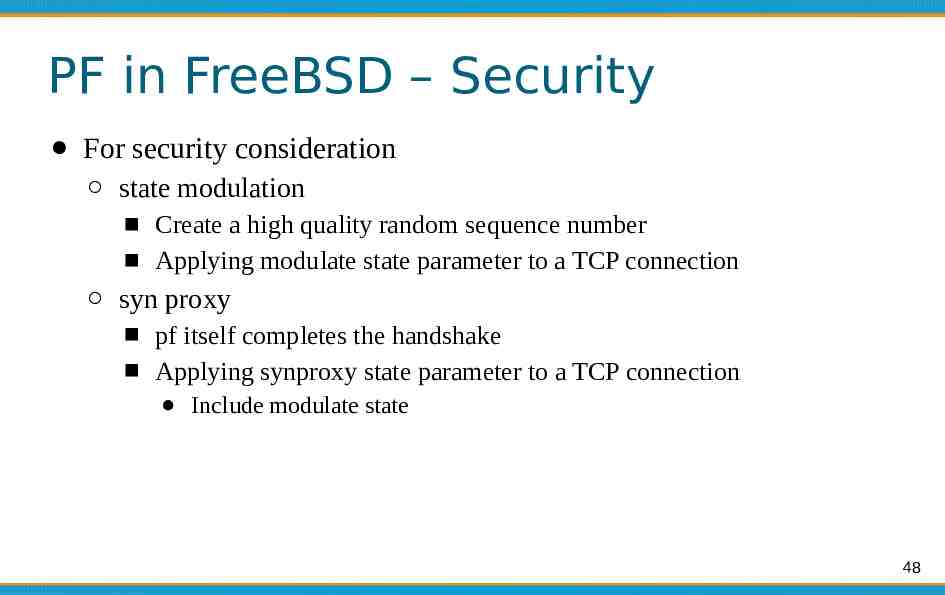
PF in FreeBSD – Security For security consideration state modulation Create a high quality random sequence number Applying modulate state parameter to a TCP connection syn proxy pf itself completes the handshake Applying synproxy state parameter to a TCP connection Include modulate state 48
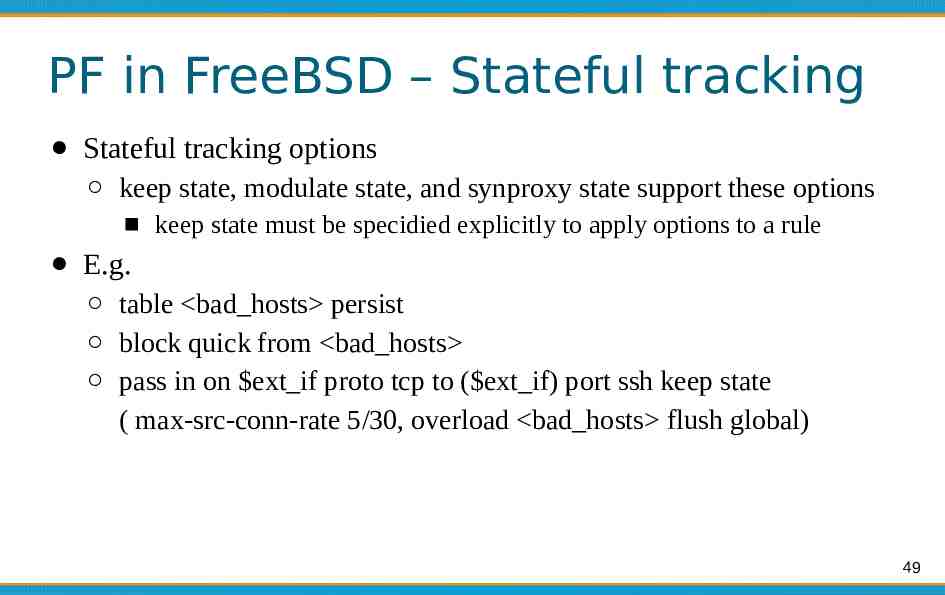
PF in FreeBSD – Stateful tracking Stateful tracking options keep state, modulate state, and synproxy state support these options keep state must be specidied explicitly to apply options to a rule E.g. table bad hosts persist block quick from bad hosts pass in on ext if proto tcp to ( ext if) port ssh keep state ( max-src-conn-rate 5/30, overload bad hosts flush global) 49
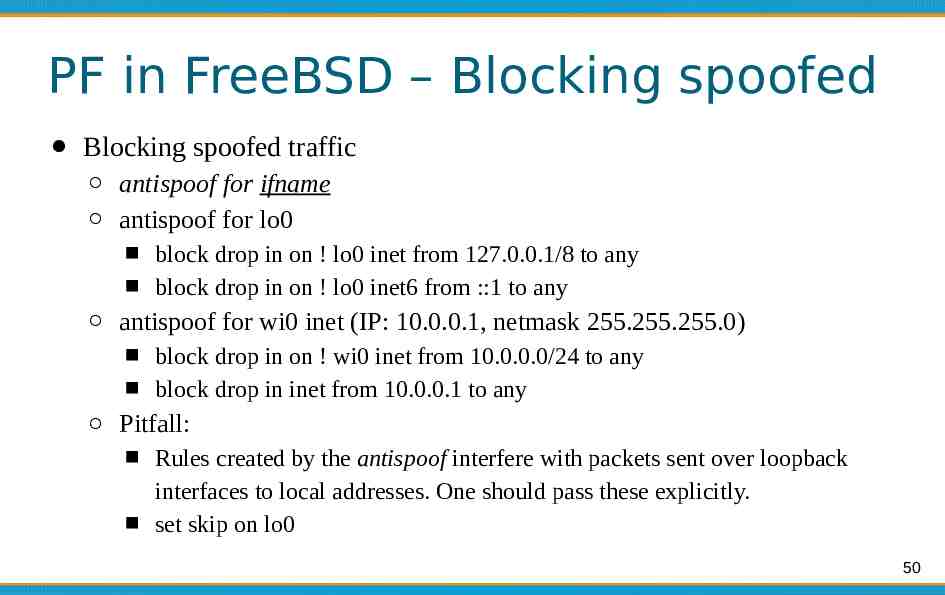
PF in FreeBSD – Blocking spoofed Blocking spoofed traffic antispoof for ifname antispoof for lo0 block drop in on ! lo0 inet from 127.0.0.1/8 to any block drop in on ! lo0 inet6 from ::1 to any antispoof for wi0 inet (IP: 10.0.0.1, netmask 255.255.255.0) block drop in on ! wi0 inet from 10.0.0.0/24 to any block drop in inet from 10.0.0.1 to any Pitfall: Rules created by the antispoof interfere with packets sent over loopback interfaces to local addresses. One should pass these explicitly. set skip on lo0 50
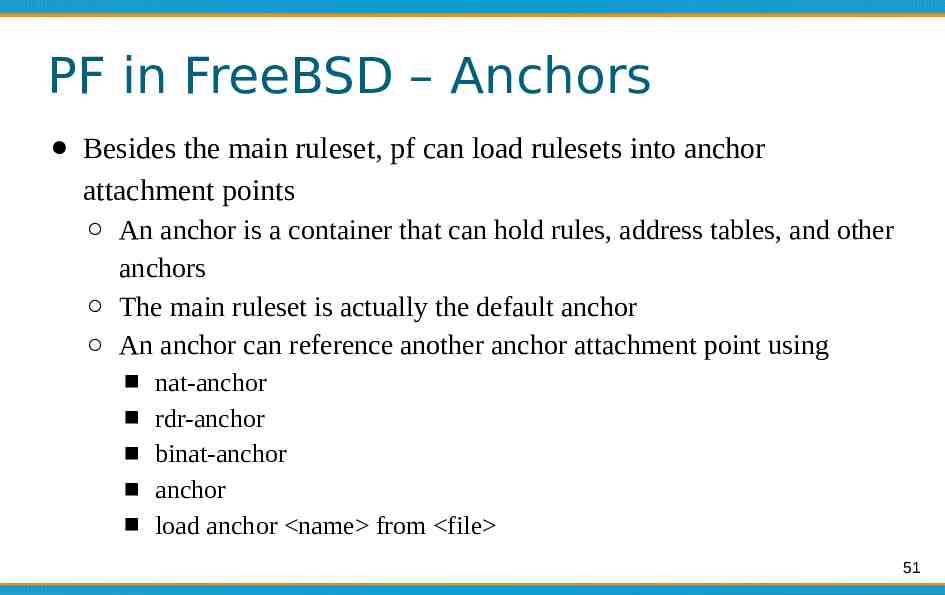
PF in FreeBSD – Anchors Besides the main ruleset, pf can load rulesets into anchor attachment points An anchor is a container that can hold rules, address tables, and other anchors The main ruleset is actually the default anchor An anchor can reference another anchor attachment point using nat-anchor rdr-anchor binat-anchor anchor load anchor name from file 51
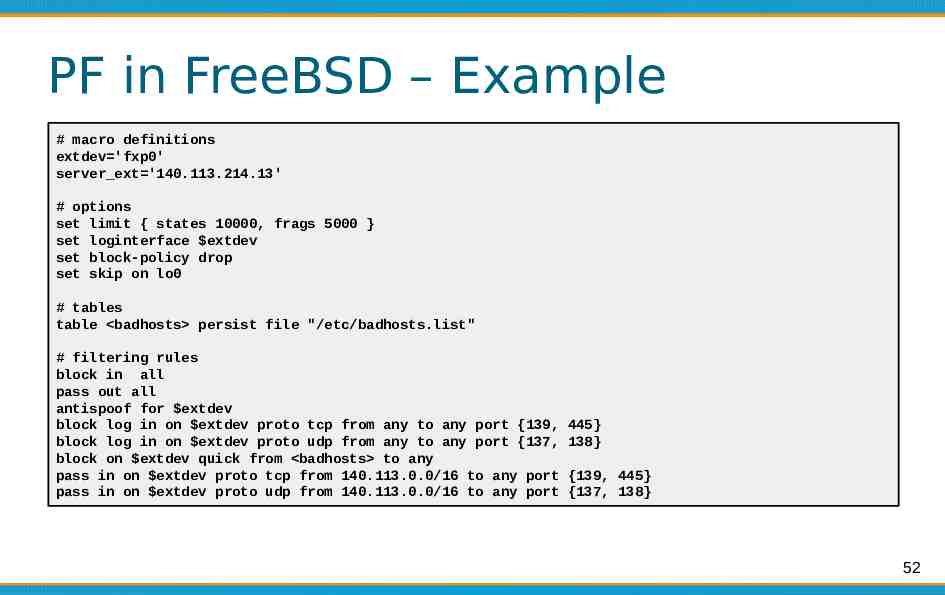
PF in FreeBSD – Example # macro definitions extdev 'fxp0' server ext '140.113.214.13' # options set limit { states 10000, frags 5000 } set loginterface extdev set block-policy drop set skip on lo0 # tables table badhosts persist file "/etc/badhosts.list" # filtering rules block in all pass out all antispoof for extdev block log in on extdev proto tcp from any to any port {139, block log in on extdev proto udp from any to any port {137, block on extdev quick from badhosts to any pass in on extdev proto tcp from 140.113.0.0/16 to any port pass in on extdev proto udp from 140.113.0.0/16 to any port 445} 138} {139, 445} {137, 138} 52
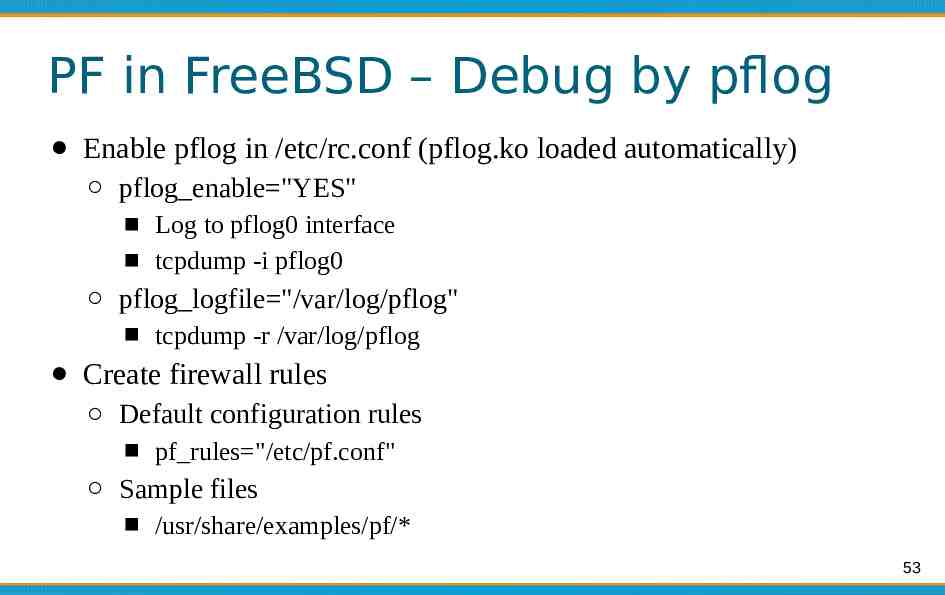
PF in FreeBSD – Debug by pflog Enable pflog in /etc/rc.conf (pflog.ko loaded automatically) pflog enable "YES" Log to pflog0 interface tcpdump -i pflog0 pflog logfile "/var/log/pflog" tcpdump -r /var/log/pflog Create firewall rules Default configuration rules pf rules "/etc/pf.conf" Sample files /usr/share/examples/pf/* 53
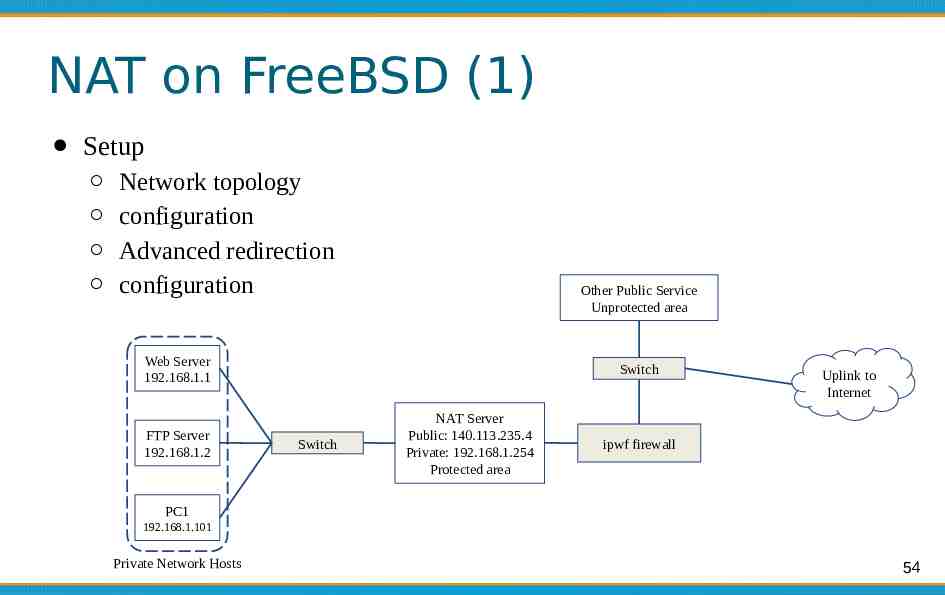
NAT on FreeBSD (1) Setup Network topology configuration Advanced redirection configuration Other Public Service Unprotected area Web Server 192.168.1.1 FTP Server 192.168.1.2 Switch Switch NAT Server Public: 140.113.235.4 Private: 192.168.1.254 Protected area Uplink to Internet ipwf firewall PC1 192.168.1.101 Private Network Hosts 54
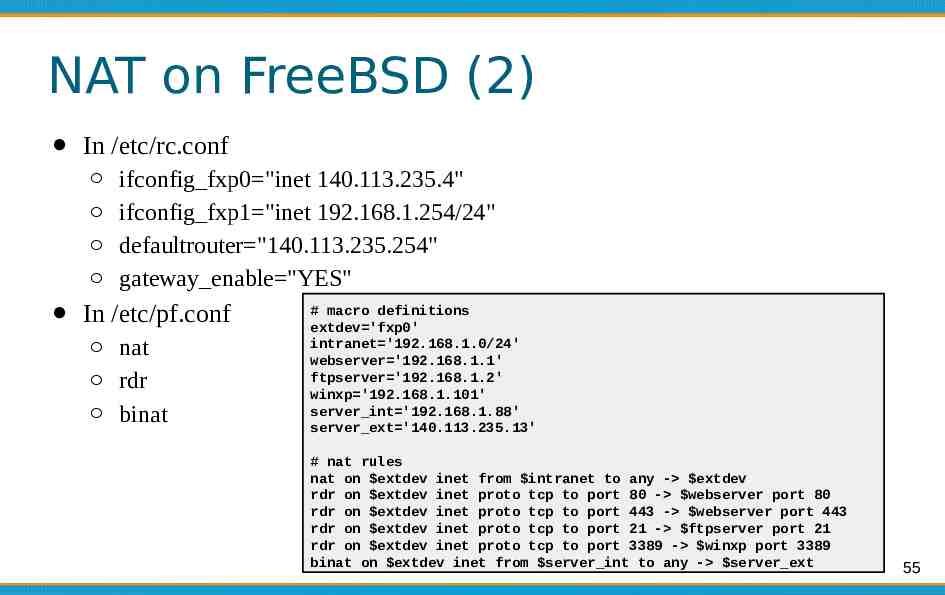
NAT on FreeBSD (2) In /etc/rc.conf ifconfig fxp0 "inet 140.113.235.4" ifconfig fxp1 "inet 192.168.1.254/24" defaultrouter "140.113.235.254" gateway enable "YES" In /etc/pf.conf nat rdr binat # macro definitions extdev 'fxp0' intranet '192.168.1.0/24' webserver '192.168.1.1' ftpserver '192.168.1.2' winxp '192.168.1.101' server int '192.168.1.88' server ext '140.113.235.13' # nat rules nat on extdev inet from intranet to any - extdev rdr on extdev inet proto tcp to port 80 - webserver port 80 rdr on extdev inet proto tcp to port 443 - webserver port 443 rdr on extdev inet proto tcp to port 21 - ftpserver port 21 rdr on extdev inet proto tcp to port 3389 - winxp port 3389 binat on extdev inet from server int to any - server ext 55
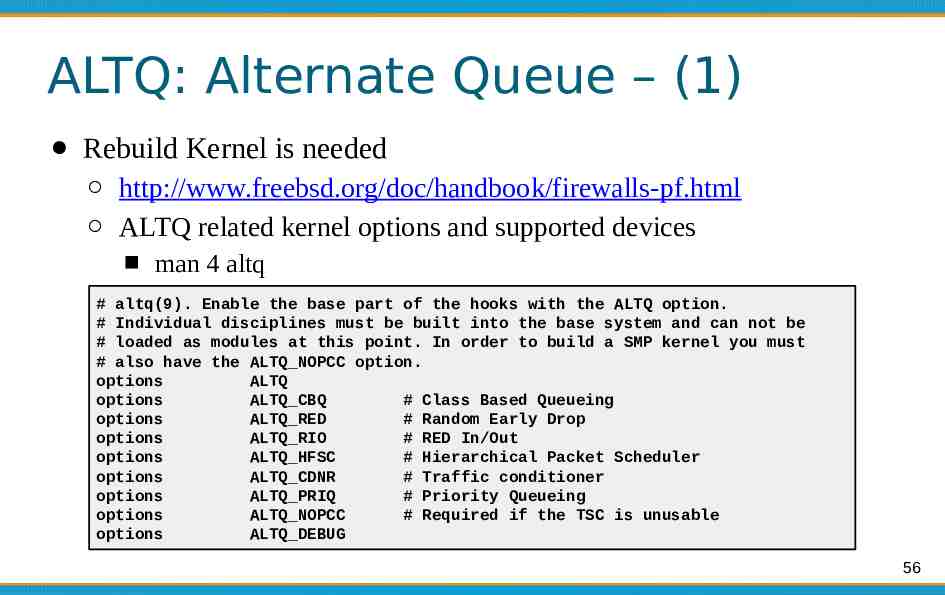
ALTQ: Alternate Queue – (1) Rebuild Kernel is needed http://www.freebsd.org/doc/handbook/firewalls-pf.html ALTQ related kernel options and supported devices man 4 altq # altq(9). Enable the base part of the hooks with the ALTQ option. # Individual disciplines must be built into the base system and can not be # loaded as modules at this point. In order to build a SMP kernel you must # also have the ALTQ NOPCC option. options ALTQ options ALTQ CBQ # Class Based Queueing options ALTQ RED # Random Early Drop options ALTQ RIO # RED In/Out options ALTQ HFSC # Hierarchical Packet Scheduler options ALTQ CDNR # Traffic conditioner options ALTQ PRIQ # Priority Queueing options ALTQ NOPCC # Required if the TSC is unusable options ALTQ DEBUG 56
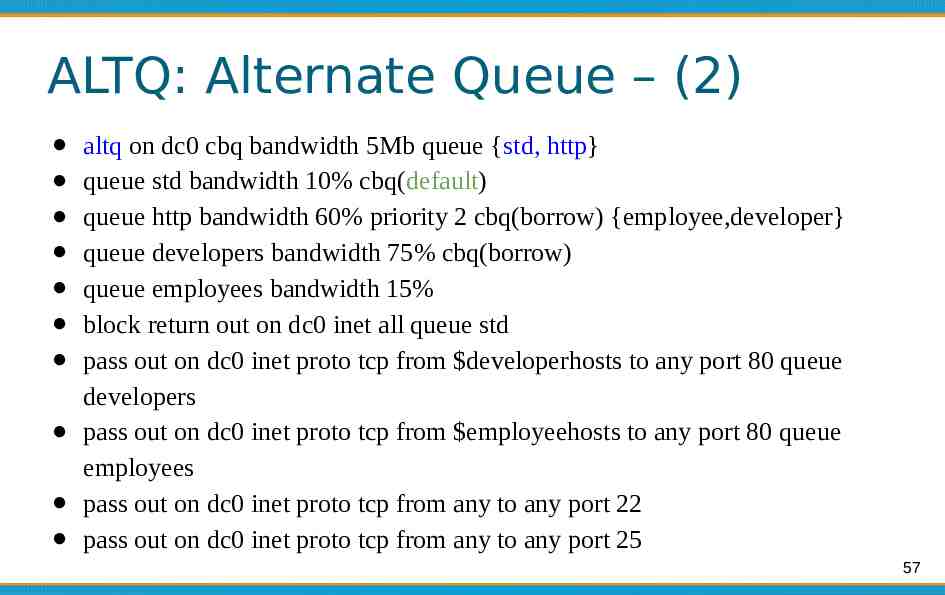
ALTQ: Alternate Queue – (2) altq on dc0 cbq bandwidth 5Mb queue {std, http} queue std bandwidth 10% cbq(default) queue http bandwidth 60% priority 2 cbq(borrow) {employee,developer} queue developers bandwidth 75% cbq(borrow) queue employees bandwidth 15% block return out on dc0 inet all queue std pass out on dc0 inet proto tcp from developerhosts to any port 80 queue developers pass out on dc0 inet proto tcp from employeehosts to any port 80 queue employees pass out on dc0 inet proto tcp from any to any port 22 pass out on dc0 inet proto tcp from any to any port 25 57





